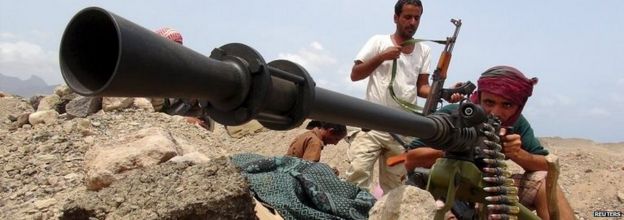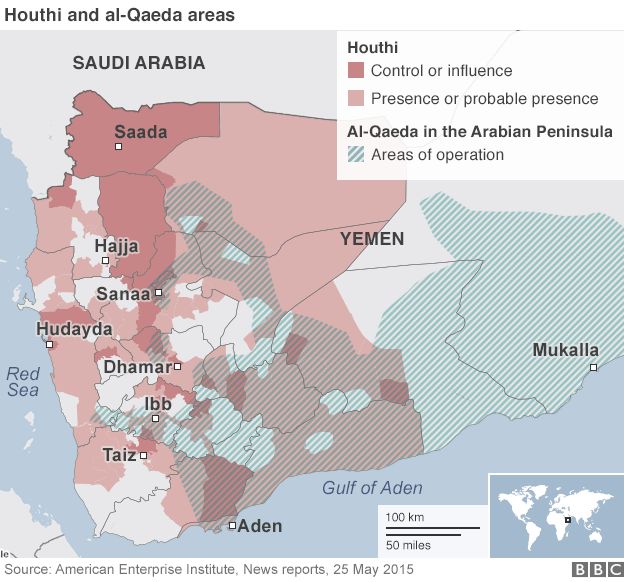Yemen: Aden 'liberated' from rebels, exiled leader says
By BBC News
Yemen's southern province of Aden has been "liberated" from Houthi rebel forces, the country's exiled vice-president has declared.
Khaled Bahah, who is in Saudi Arabia, said his government would work to restore basic services there.Aden has for months seen heavy fighting between rebels and loyalist forces backed by Saudi-led air strikes.
The government fled from its stronghold in Aden in March as the Houthis pushed towards the provincial capital.
A major offensive to drive the Houthis out of Aden was launched earlier this week and made successive advances.
However pockets of fighting were reported in parts of Aden on Friday, and rebels still held the northern and eastern entrances to the city, witnesses said.
Analysis: Frank Gardner, BBC security correspondent
The Saudi leadership is feeling triumphant over today's announcement of what it calls "the liberation of Aden".A Saudi advisor told the BBC this was the culmination of a 10-week long secret plan involving air, sea and land forces, using Yemeni fighters trained in Saudi Arabia.
After Aden, he said the next military objective would be retaking the Yemeni city of Taiz from the Houthi rebels.
For nearly four months now, a Saudi-led coalition of air forces have been pummelling rebel Houthi forces across Yemen in the hopes of driving them back to their northern stronghold and forcing a surrender.
Thousands have been killed in this conflict and Yemen faces a humanitarian catastrophe.
The endgame may now be closer but the rebels still control much of Yemen, while Saudi Arabia is unlikely to give up its campaign now. Peace for Yemenis is still some way off.
If confirmed this would mark the first time government officials had returned to the country time since taking refuge in Riyadh.
In a statement on his Facebook page, Khaled Bahah said: "The government announces the liberation of the province of Aden on the first day of Eid al-Fitr which falls on 17 July.
"We will work to restore life in Aden and all the liberated cities, to restore water and electricity."
Aden - the country's main port and second city - has been devastated by weeks of clashes and air strikes.

Why is there fighting in Yemen?
- Northern Shia Muslim rebels known as Houthis, backed by forces loyal to Yemen's ex-president, have taken over parts of the country, including the capital, Sanaa, and forced the government into exile
- The rebels accused the government of corruption and of planning to marginalise their heartland within a proposed federal system
- Forces loyal to the government, and militia from southern Yemen, have been battling the Houthis and their allies since clashes erupted late last year
- Neighbouring Sunni Muslim power Saudi Arabia has given refuge to the exiled Yemeni government and is leading a coalition air campaign aimed at driving the rebels back and restoring the government
- Saudi Arabia has accused Shia-ruled regional rival Iran of arming the rebels, which Iran denies
- Al-Qaeda's Yemeni branch has exploited the instability and expanded its presence; Islamic State group has also established a Yemen affiliate and carried out several deadly bombings
Mr Hadi had taken refuge there after the Houthis consolidated their control of the capital, Sanaa.
The Saudis say the campaign is aimed at forcing the rebels - who they say are armed by regional Shia rival Iran - to retreat and to restore the exiled government.
Iran denies backing the Houthis militarily.
The UN says more than 3,200 people, half of them civilians, have been killed in air strikes and fighting on the ground in the past 15 weeks.
Another one million civilians have been displaced by the conflict and more than 80% of Yemen's 25 million people now need some form of humanitarian aid.



0 Comments:
Post a Comment
Subscribe to Post Comments [Atom]
<< Home